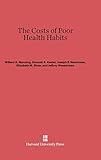The Costs of Poor Health Habits / Willard G. Manning, Emmett B. Keeler, Joseph P. Newhouse, Elizabeth M. Sloss, Jeffrey Wasserman.
Material type: TextPublisher: Cambridge, MA : Harvard University Press, [2013]Copyright date: ©1991Edition: Reprint 2014Description: 1 online resource (223 p.) : 1 line illustration, 74 tablesContent type:
TextPublisher: Cambridge, MA : Harvard University Press, [2013]Copyright date: ©1991Edition: Reprint 2014Description: 1 online resource (223 p.) : 1 line illustration, 74 tablesContent type: - 9780674422254
- 9780674422261
- Alkoholismus
- Alkoholkonsum
- Bewegungsmangel
- Costs and Cost Analysis
- Gesundheitsschaden
- Gesundheitswesen
- Health Behavior
- Health behavior
- Life Style
- Lifestyles
- Rauchen
- Soziale Kosten
- Wirtschaft
- Alcohol Drinking -- economics
- Health behavior -- Economic aspects
- Life Style
- MEDICAL / Health Risk Assessment
- MEDICAL / Public Health
- BUSINESS & ECONOMICS / Insurance / Health
- 338.4/3306461
- RA776.9
- online - DeGruyter
| Item type | Current library | Call number | URL | Status | Notes | Barcode | |
|---|---|---|---|---|---|---|---|
 eBook
eBook
|
Biblioteca "Angelicum" Pont. Univ. S.Tommaso d'Aquino Nuvola online | online - DeGruyter (Browse shelf(Opens below)) | Online access | Not for loan (Accesso limitato) | Accesso per gli utenti autorizzati / Access for authorized users | (dgr)9780674422261 |
Frontmatter -- Contents -- Preface -- 1. An Overview -- 2. Conceptual Framework -- 3. Data and Statistical Methods -- 4. The External Costs of Smoking -- 5. The External Costs of Heavy Drinking -- 6. The External Costs of Sedentary Life-Styles -- 7. Conclusions, Limitations, and Implications -- A Literature Review of the Costs of Smoking and Drinking -- B. Survival Parameters from the HRA Model -- C. HIE Habit Batteries -- D. Statistical Methods -- E . Comparability of HIE and NHIS -- F . Excise Taxes and Demand -- G. Parameters Used in the Cost Model -- H. A Note on the Alcohol Tax -- Notes -- Bibliography -- Index -- Selected RAND Books
restricted access online access with authorization star
http://purl.org/coar/access_right/c_16ec
Poor health habits (drinking, smoking, lack of exercise) obviously take their toll on individuals and their families. The costs to society are less obvious but certainly more far-reaching. This investigation is the first to quantify the financial burden these detrimental habits place on American taxpayers. Willard Manning and his colleagues measure the direct costs of poor health habits (fire damage, motor vehicle accidents, legal fees), as well as collectively financed costs (medical care, employee sick leave, group health and life insurance, nursing home care, retirement pensions, liability insurance). Consider two co-workers covered by their employer's health plan: both pay the same premium, yet if one drinks heavily, the other--through their mutual insurance program--involuntarily funds the resulting health problems. After laying out their conceptual framework, methods, and analytical approach, the authors describe precisely how and to what extent drinking, smoking, and lack of exercise are currently subsidized, and make recommendations for reducing or reallocating the expense. They present, for example, a persuasive case for raising excise taxes on alcohol. The authors correlate their data to make costs comparable, to avoid double counting, and to determine the exact costs of each of these poor health habits and some of their findings are quite surprising. This unique study will be indispensable to public health policy specialists and researchers, as well as to health economists.
Mode of access: Internet via World Wide Web.
In English.
Description based on online resource; title from PDF title page (publisher's Web site, viewed 30. Aug 2021)


